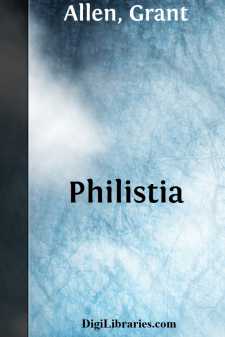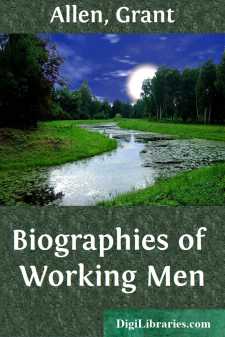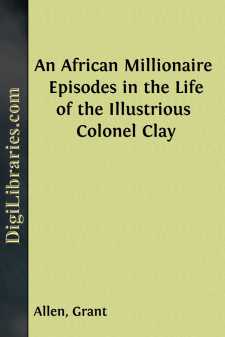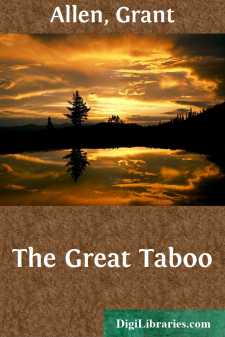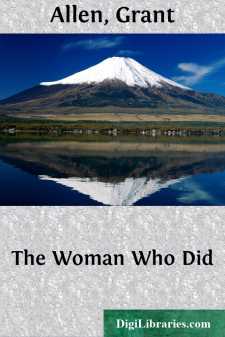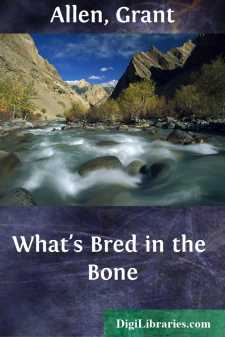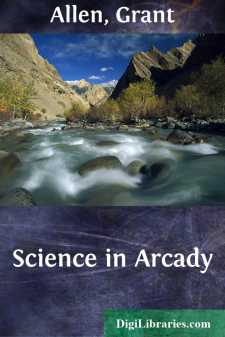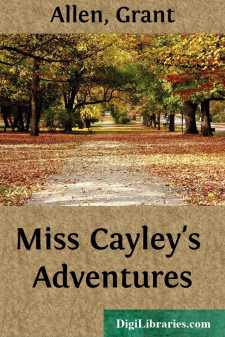Categories
- Antiques & Collectibles 13
- Architecture 36
- Art 48
- Bibles 22
- Biography & Autobiography 815
- Body, Mind & Spirit 144
- Business & Economics 28
- Children's Books 18
- Children's Fiction 14
- Computers 4
- Cooking 94
- Crafts & Hobbies 4
- Drama 346
- Education 58
- Family & Relationships 59
- Fiction 11834
- Games 19
- Gardening 17
- Health & Fitness 34
- History 1378
- House & Home 1
- Humor 147
- Juvenile Fiction 1873
- Juvenile Nonfiction 202
- Language Arts & Disciplines 89
- Law 16
- Literary Collections 686
- Literary Criticism 179
- Mathematics 13
- Medical 41
- Music 40
- Nature 179
- Non-Classifiable 1768
- Performing Arts 7
- Periodicals 1453
- Philosophy 65
- Photography 2
- Poetry 896
- Political Science 203
- Psychology 44
- Reference 154
- Religion 515
- Science 126
- Self-Help 85
- Social Science 83
- Sports & Recreation 34
- Study Aids 3
- Technology & Engineering 59
- Transportation 23
- Travel 463
- True Crime 29
Grant Allen
Grant Allen was a Canadian science writer, novelist, and advocate of evolutionary theory in the late 19th century. He is best known for his mystery novel "The Woman Who Did" (1895), which explored controversial themes of women's rights and social norms. Allen's extensive body of work also included scientific essays and popular fiction, contributing significantly to both literary and scientific communities of his time.
Author's Books:
Sort by:
by:
Grant Allen
CHAPTER I. CHILDREN OF LIGHT. It was Sunday evening, and on Sundays Max Schurz, the chief of the London Socialists, always held his weekly receptions. That night his cosmopolitan refugee friends were all at liberty; his French disciples could pour in from the little lanes and courts in Soho, where, since the Commune, they had plied their peaceful trades as engravers, picture-framers,...
more...
by:
Grant Allen
THOMAS TELFORD, STONEMASON. High up among the heather-clad hills which form the broad dividing barrier between England and Scotland, the little river Esk brawls and bickers over its stony bed through a wild land of barren braesides and brown peat mosses, forming altogether some of the gloomiest and most forbidding scenery in the whole expanse of northern Britain. Almost the entire bulk of the counties...
more...
by:
Grant Allen
THE EPISODE OF THE MEXICAN SEER My name is Seymour Wilbraham Wentworth. I am brother-in-law and secretary to Sir Charles Vandrift, the South African millionaire and famous financier. Many years ago, when Charlie Vandrift was a small lawyer in Cape Town, I had the (qualified) good fortune to marry his sister. Much later, when the Vandrift estate and farm near Kimberley developed by degrees into the...
more...
by:
Grant Allen
CHAPTER I. IN MID PACIFIC. "Man overboard!" It rang in Felix Thurstan's ears like the sound of a bell. He gazed about him in dismay, wondering what had happened. The first intimation he received of the accident was that sudden sharp cry from the bo'sun's mate. Almost before he had fully taken it in, in all its meaning, another voice, farther aft, took up the cry once more in an...
more...
by:
Grant Allen
I. Mrs. Dewsbury's lawn was held by those who knew it the loveliest in Surrey. The smooth and springy sward that stretched in front of the house was all composed of a tiny yellow clover. It gave beneath the foot like the pile on velvet. One's gaze looked forth from it upon the endless middle distances of the oak-clad Weald, with the uncertain blue line of the South Downs in the background....
more...
by:
Grant Allen
CHAPTER I. ELMA'S STRANGER. It was late when Elma reached the station. Her pony had jibbed on the way downhill, and the train was just on the point of moving off as she hurried upon the platform. Old Matthews, the stout and chubby-cheeked station-master, seized her most unceremoniously by the left arm, and bundled her into a carriage. He had known her from a child, so he could venture upon such...
more...
by:
Grant Allen
About the middle of the Miocene period, as well as I can now remember (for I made no note of the precise date at the moment), my islands first appeared above the stormy sheet of the North-West Atlantic as a little rising group of mountain tops, capping a broad boss of submarine volcanoes. My attention was originally called to the new archipelago by a brother investigator of my own aerial race, who...
more...
by:
Grant Allen
I. LETTER-WRITERS. Since old Leisure died, we have come to think ourselves altogether too fine and too busy to cultivate the delightful art of correspondence. Dickens seems to have been almost the last man among us who gave his mind to letter-writing; and his letters contain some of his very best work, for he plunged into his subject with that high-spirited abandonment which we see in...
more...
by:
Grant Allen
FALLING IN LOVE An ancient and famous human institution is in pressing danger. Sir George Campbell has set his face against the time-honoured practice of Falling in Love. Parents innumerable, it is true, have set their faces against it already from immemorial antiquity; but then they only attacked the particular instance, without venturing to impugn the institution itself on general principles. An old...
more...
by:
Grant Allen
THE ADVENTURE OF THE CANTANKEROUS OLD LADY On the day when I found myself with twopence in my pocket, I naturally made up my mind to go round the world. It was my stepfather's death that drove me to it. I had never seen my stepfather. Indeed, I never even thought of him as anything more than Colonel Watts-Morgan. I owed him nothing, except my poverty. He married my dear mother when I was a girl at...
more...


